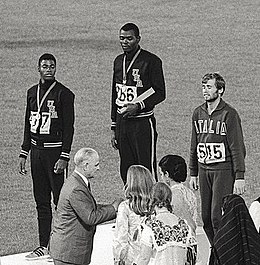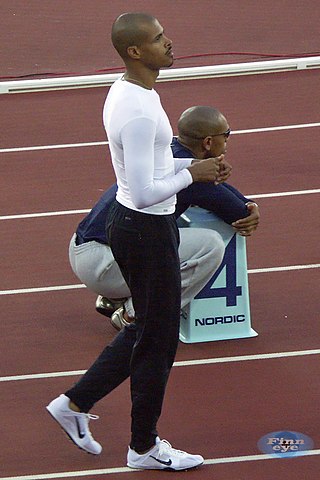
The men's 400 metres hurdles at the 2004 Summer Olympics as part of the athletics program were held at the Athens Olympic Stadium from August 23 to 26. There were 35 competitors from 24 nations. The event was won by Félix Sánchez of the Dominican Republic, the nation's first medal in the men's 400 metres hurdles. Silver went to Danny McFarlane of Jamaica, returning to the podium in the event for the first time since 1992. Naman Keïta's bronze was France's first medal in the event in over 100 years; the last Frenchman to medal in the long hurdles was Henri Tauzin in 1900. The United States' five-Games gold medal streak ended; for only the second time in the history of the event, Americans competed but won no medals.
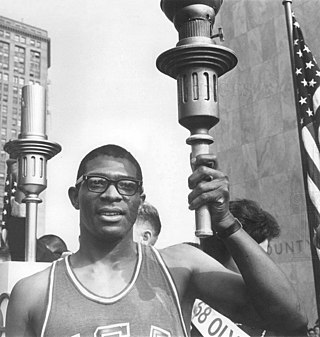
The men's 110 metres hurdles was the shorter of the men's hurdle races in the Athletics at the 1964 Summer Olympics program in Tokyo. It was held on 17 October and 18 October 1964. 38 athletes from 24 nations entered, with 1 not starting in the first round. The maximum number of athletes per nation had been set at 3 since the 1930 Olympic Congress. The first round was held on 17 October, with the semifinals and the final on 18 October. The event was won by Hayes Jones of the United States, the nation's seventh of nine consecutive victories and the 13th overall gold medal in the event for the Americans. Jones was the fifth man to win two medals in the event. For the first time since 1936, an athlete from outside the United States made the podium, as Anatoly Mikhailov of the Soviet Union took bronze to break the American streak of four consecutive podium sweeps and earn the first Soviet medal in the event.

The men's 400 metres hurdles was the longer of the men's hurdle races in the Athletics at the 1964 Summer Olympics program in Tokyo. It was held on 14 October, 15 October, and 16 October 1964. 39 athletes from 26 nations competed, with 1 more not starting in the first round. The maximum number of athletes per nation had been set at 3 since the 1930 Olympic Congress. The first round was held on 14 October, with the semifinals on 15 October and the final on 16 October. The event was won by Rex Cawley of the United States, the nation's sixth consecutive and 11th overall victory in the men's 400 metres hurdles. For the first time since 1952, the Americans did not sweep the event. John Cooper earned Great Britain's first medal in the event since 1928 with his silver; Salvatore Morale took Italy's first-ever medal in the 400 metres hurdles with his bronze.

Eddy Ottoz is an Italian former athlete and bronze medalist at the 1968 Summer Olympics in the 110 metre hurdles.
The men's 110 metres hurdles at the 1988 Summer Olympics in Seoul, South Korea had an entry list of 43 competitors from 31 nations, with six qualifying heats, four second-round races (32) and two semifinals (16) before the final (8) took place on Monday September 26, 1988. The maximum number of athletes per nation had been set at 3 since the 1930 Olympic Congress. The event was won by Roger Kingdom of the United States, the second man to successfully defend Olympic gold in the event. It was the nation's 17th title in the event. Colin Jackson's silver was Great Britain's first medal in the event since 1936.

The men's 110 metres hurdles was an event at the 1996 Summer Olympics in Atlanta, Georgia. The final was held on July 29, 1996. Sixty-two athletes from 39 nations competed. The maximum number of athletes per nation had been set at 3 since the 1930 Olympic Congress. The event was won by Allen Johnson of the United States, the nation's 18th title in the event. Florian Schwarthoff's bronze was the first medal in the event for Germany, though East Germany had won gold in 1980.

The men's 110 metres hurdles at the 2008 Summer Olympics took place on 18–21 August at the Beijing National Stadium. Forty-two athletes from 32 nations competed. The event was won by Dayron Robles of Cuba, the nation's second gold medal in the high hurdles.
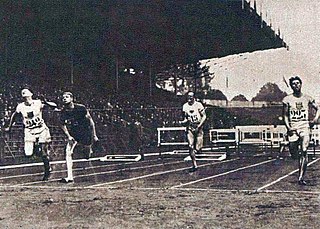
The men's 110 metres hurdles event was part of the track and field athletics programme at the 1924 Summer Olympics. The competition was held on Tuesday, July 8, 1924, and on Wednesday, July 9, 1924. Thirty-one hurdlers from 17 nations competed. The maximum number of athletes per nation was 4. The event was won by Daniel Kinsey of the United States, the nation's sixth victory in the seven times the event had been held. South Africa and Sweden each won their first 110 metres hurdles medals with Sydney Atkinson's silver and Sten Pettersson's bronze, respectively.

The men's 110 metres hurdles at the 1980 Summer Olympics in Moscow, Soviet Union had an entry list of 23 competitors from 16 nations, with three qualifying heats and two semifinals (16) before the final (8) took place on Sunday 27 July 1980. The maximum number of athletes per nation had been set at 3 since the 1930 Olympic Congress. The event was won by Thomas Munkelt of East Germany, the first medal by a German runner in the event. Alejandro Casañas of Cuba took silver for the second Games in a row, making him the eighth man with two medals in the event. Aleksandr Puchkov's bronze was the Soviet Union's second medal in the event and first since 1964.

The men's 110 metres hurdles event at the 1936 Summer Olympic Games took place on August 5 and August 6. Thirty-one athletes from 20 nations competed. The maximum number of athletes per nation had been set at 3 since the 1930 Olympic Congress. The final was won by American Forrest Towns. It was the second of nine consecutive American victories, and the eighth overall gold medal for the United States in the 110 metres hurdles. Don Finlay of Great Britain became the second man to win two medals in the event.

The men's 400 metres hurdles event at the 1936 Summer Olympic Games took place on August 3 and August 4. There were 32 competitors from 20 nations. The maximum number of athletes per nation had been set at 3 since the 1930 Olympic Congress. The final was won by American Glenn Hardin. After two Games of silver and bronze medals, it was the United States' first victory since 1920 and sixth overall. However, it was the first time since 1900 that the Americans had only one medalist in the event. John Loaring took Canada's first 400 metres hurdles medal since 1900 with his silver. Miguel White gave the Philippines a bronze in its 400 metres hurdles debut.

The men's 110 metres hurdles event at the 1948 Summer Olympic Games took place on 3 and 4 August. Twenty-eight athletes from 18 nations competed. The maximum number of athletes per nation had been set at 3 since the 1930 Olympic Congress. The final was won by American William Porter. Porter's compatriots, Clyde Scott and Craig Dixon took 2nd and 3rd place. It was the third of nine consecutive American victories, and the ninth overall gold medal for the United States in the 110 metres hurdles. It was also the first of four consecutive American podium sweeps, and the fifth overall sweep by the United States in the event.

The men's 110 metres hurdles hurdling event at the 1932 Summer Olympics took place on August 2 and August 3 at the Los Angeles Memorial Coliseum. Seventeen athletes from 10 nations competed. The 1930 Olympic Congress in Berlin had reduced the limit from 4 athletes per NOC to 3 athletes. The event was won by George Saling of the United States, the first in a streak of nine victories by the Americans. It initially appeared that the Americans had swept the medals, but film review showed that Don Finlay had come in third over Jack Keller; this gave Great Britain its first medal in the event since 1896.

The men's 110 metres hurdling event at the 1960 Olympic Games took place between September 3 and September 5. Thirty-six athletes from 21 nations competed. The maximum number of athletes per nation had been set at 3 since the 1930 Olympic Congress. The event was won by Lee Calhoun of the United States, the first man to successfully defend Olympic gold in the 110 metres hurdles. It was the sixth of nine consecutive American victories, and the 12th overall gold medal for the United States in the 110 metres hurdles. It was also the fourth of four consecutive American podium sweeps, and the eighth overall sweep by the United States in the event.

The men's 110 metres hurdles competition at the 2012 Summer Olympics in London, United Kingdom was held at the Olympic Stadium on 7–8 August. Fifty-three athletes from 33 nations competed. The event was won by Aries Merritt of the United States, the nation's first championship in the event since 1996 and 19th overall. Hansle Parchment's bronze was Jamaica's first medal in the men's high hurdles.

The Men's 110 metres hurdles event at the 1976 Summer Olympics in Montreal was held on July 26, 1976, and on July 28, 1976. Twenty-four athletes from 17 nations competed. The maximum number of athletes per nation had been set at 3 since the 1930 Olympic Congress.
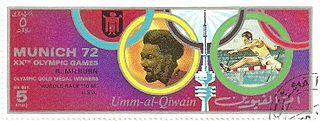
The men's 110 metres hurdles event at the 1972 Summer Olympics in Munich was held from 3–7 September. Thirty-nine athletes from 27 nations competed. The maximum number of athletes per nation had been set at 3 since the 1930 Olympic Congress. The event was won by Rod Milburn of the United States, the nation's ninth of nine consecutive victories and the 15th overall gold medal in the event for the Americans. Guy Drut's silver was France's first medal in the event and the best result by a non-American since 1936.
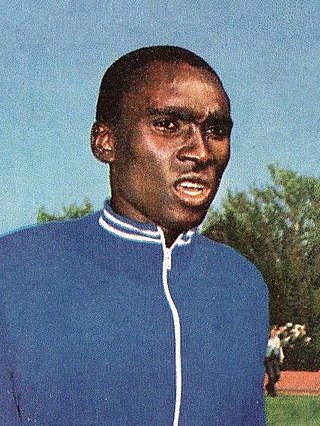
The men's 400 metres hurdles was an event at the 1972 Summer Olympics in Munich. The competition was held on 31 August - 2 September. There were 37 competitors from 25 nations. The maximum number of athletes per nation had been set at 3 since the 1930 Olympic Congress. The event was won by John Akii-Bua of Uganda, the nation's first medal in the event and first gold medal in any Olympic event. Ralph Mann returned the United States to the podium after a one-Games absence with his silver medal, while David Hemery added a bronze to his 1968 gold to become the fifth man to earn multiple medals in the event while extending Great Britain's podium streak in the 400 metres hurdles to three Games.

The Ottoz family is a sporting family consisting of many athletes, one of whom became a manager in the world of athletics.

The men's 110 metre hurdles at the 2004 Summer Olympics as part of the athletics program were held at the Athens Olympic Stadium from August 24 to 27. Forty-seven athletes from 34 nations competed. The event was won by Liu Xiang of China, the nation's first medal in the event. Terrence Trammell and Anier García became the 11th and 12th men to win multiple medals in the 110 metres hurdles.
